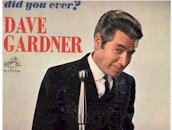|
|
|
 |
The "guvmint" seems to be on Brother Dave's mind. This album is filled with more musings on politics and world leaders, including Ben Franklin, Franklin D. Roosevelt and Harry Truman. Gardner gives us tips on buying a bomb shelter and reveals the true motivation for both the U.S. and Russian space programs. |
|
"Sometimes what we've been told is bad is only an expression of freedom." |
| Liner Notes Transcribed By Gary Arnold | |
| Dapper Dave Gardnerís oblique approach to
comedy rarely is without a serious foundation in the foibles of human nature, sex,
politics, religion and international relations. Most modern "think" comedians
merely milk our sacred cows; Gardner, with cherubic innocence, leads them blithely off to
the slaughterhouse. Neither does Brother Dave stand with lance poised at the windmills of
social inequalities. "Some do-gooders want to help people who donít need help, donít want it," he says, "Success is getting what you want. Happiness is wanting what you get. If somebody is less than you are then you should help Ďem. If they are more than you are then you should learn from Ďem. So whereís the room for prejudice?" Gardner is ambidextrous when his humor waves the flag. In one hand he whirls Old Glory, in the other he holds the Confederate banner. Tennessee born, Brother Dave is the Southern intellectualsí first sure comedic sign that the South has indeed risen again. "Iím Southern and Iím American," he says, grinning innocently, "and Iím not ashamed of either one. I ainít partial to North, South, rich, poor, Democrat, or Republican. I was conservative when I was poor." In this album Gardnerís irreverence for "tread lightly" topics finds stinging, hilarious targets in U2 pilot Gary Powers, the astronauts, President Kennedy Ė whose New England accent mingles outrageously with Gardnerís own deep South vernacular Ė Werner Von Braun, bomb shelters and Texas cops. His meeting between Abe Lincoln and General Robert E. Lee will draw as many guffaws from Yankees as from Johnny Rebs. Of Brother Daveís humor Bob Hope, foremost of the great topical comedians, says, "Dave is one of the rare humorists who gets his controversial point across and still is funny. Too many of the others are so obsessed with messages they forget they are comics. But Dave makes me laugh." When not cutting albums Gardner keeps busy on tours, mostly in Dixie, where he finds audiences more "hip" than in other sections of the country. His appearances at universities and on concert stages, sometimes as for north as Chicago, draw devoted followers from all age groups, from college students to married couples to oldsters. They are absorbed with Gardnerís deft retaliatory needle in contrast to the blunt broadswords of his north-of-the-Mason-Dixon-line contemporaries. "Dearly beloved," preaches Brother Dave, "I work in thought patterns and impersonal observations. Iím neither right nor left. Humor should be as impersonal as the sun. Iím like that. Iím on all sides of an issue." He refuses to consider himself a social commentator, but Gardner, who now makes his home in SOUTHERN California, wastes little time bemoaning the worldís ills. Heís too busy with solutions which penetrate his slick humor down to the bedrock of horse sense, much in the manner of Will Rogersí lackadaisical observations of another era. Brother Dave combines wit, originality, a distinct delivery and, perhaps most important of all, deep compassion, to get his message across. Only after his audience has laughed does it see the underlying core of truth that lingers long enough for Gardner to embark on still another probe of mortal frailty. And one can only sense Gardnerís own slightly tender spot Ė his beloved South. He cannot be charged with reviving the war between the states. But should the Confederacy rise again there is a distinct feeling that Brother Dave has a squirrel rifle near at hand and a proud gray uniform, probably with corporal stripes, just back from the cleaners. Vernon Scott |
|
| [Back To Album List] | [Brother Dave Home] |